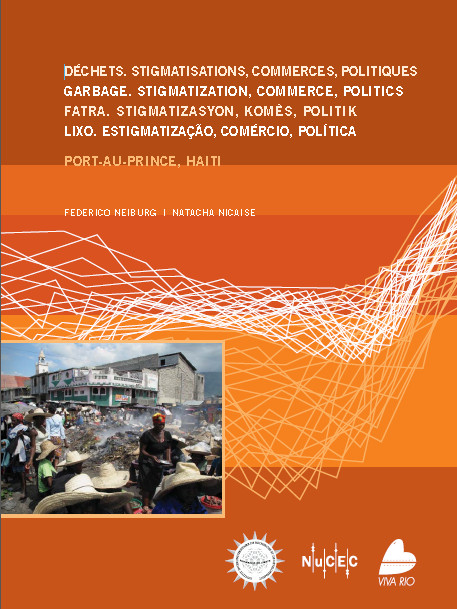Déchets. Stigmatisation, commerces, politiques. Port-Au-Prince
 |
Garbage, stigmatization, commerce, politics
Fatra, stigmatizasyon, komes, politik
Lixo, estigmatizacao, comercio, politica
report Apr 2010 ; 123 pages
Aut.
Ed. NuCEC - Rio de Janeiro Viva Rio - Croix des Bouquets ; Isbn: 978-85-61882-04-4
Downloadable format: PdF
Downloadable from the publisher
Résumé:
Comment les habitants des quartiers les plus pauvres d’une grande métropole perçoivent-ils et gèrent-ils les ordures? Quels sont les circuits qui permettent la transformation d’objets en marchandises? Que représente les déchets?
Cette étude propose d’aborder l’organisation de l’espace social contemporain haïtien. Abstract:
How do the residents of the poorest and most degraded districts of a large metropolis perceive and interact with garbage? What are the circuits that enable discarded objects to be transformed into merchandise? What are the personal and collective hygiene habits in regions taken to be extremely fi lthy? How does the population perceive the actions of the State, the international cooperation agencies and the NGOs that foreground the waste issue as a strategic area of intervention? What does garbage mean for the different social actors? Through an ethnography of the universe of garbage in Port-au-Prince, this text presents a discussion of three core questions in the structuring of contemporary social space in the region: the dynamic of social stigmatizations, the structuring of trade circuits, and the relation between local political dynamics and the implementation of public policies. Resumen:
Kouman rezidan nan katye ki pi pòv epi k pi degrade yo nan yon gwo Metwopolis konsèptualize fatra epi relasyone yo ak li? Ki rezo komèsyal sa yo ki pèmèt yo transfòme objè ke yo jete yo an machandiz? Ki sa yo ki se abitid ijyèn pèsonèl epi kolektif nan rejyon ke yo konsidere ki sal anpil yo? Kòman pèp lan wè aksyon Leta yo, ajans koperasyon entènasyonal yo ak ONGs yo, fason yo pran fatra a tankou youn nan domèn ki bon pou travay? Ki sa ki fatra pou diferan ajan sosyal yo? Atravè ètnografi sou linivè fatra a nan Pòtoprens lan, tèks sa a, prezante yon diskisyon ki gen twa keksyon kle nan strukturasyon espas sosyal resan an: dinamik stigmatizasyon sosyal yo, strukturasyon rezo komèsyal yo epi relasyon ki genyen ant dinamik politik lokal yo ak aplikasyon politik piblik yo. Resumo:
0Como os moradores dos bairros mais pobres e degradados de uma grande metrópole percebem e lidam com o lixo? Quais são os circuitos que permitem transformar objetos descartados em mercadorias? Quais são os hábitos de higiene pessoal e coletiva em regiões tidas como extremamente sujas? Como a população percebe as ações do Estado, das agências internacionais de cooperação e das ONGs que têm no lixo um dos domínios privilegiados de ação? O que é lixo para os diferentes atores sociais? Através da etnografi a do universo do lixo em Porto Príncipe, esse texto apresenta uma discussão acerca de três questões-chave na estruturação do espaço social contemporâneo: a dinâmica das estigmatizações sociais, a estruturação de circuitos comerciais e a relação entre as dinâmicas políticas locais e a implementação de políticas públicas. Sommaire:
1 introduction 9
2 déchets et stigmatisations sociales 12
3 les principes qui organisent la distribution inégale des stigmates associés à la saleté 14
4 grannèg jete malerè ranmase 17
5 les circuits commerciaux 18
6 kokorat – vandè pa pèz 19
7 les ateliers 20
8 les latrines 21
9 bayakous 22
10 les entreprises 24
11 les déchets, c'est politique 26
12 conclusions 30
13 bibliographie 109
14 cartes 111
15 photos 115
Keyword: |
Country: |
Publishers/Broadcasters: |
|
NuCEC
-
Núcleo de Pesquisas em Cultura e Economia - Rio de Janeiro - Brazil |
Viva Rio - Croix des Bouquets - Haiti |
If there is a broken link, we will be pleased to receive a message: communication@pseau.org